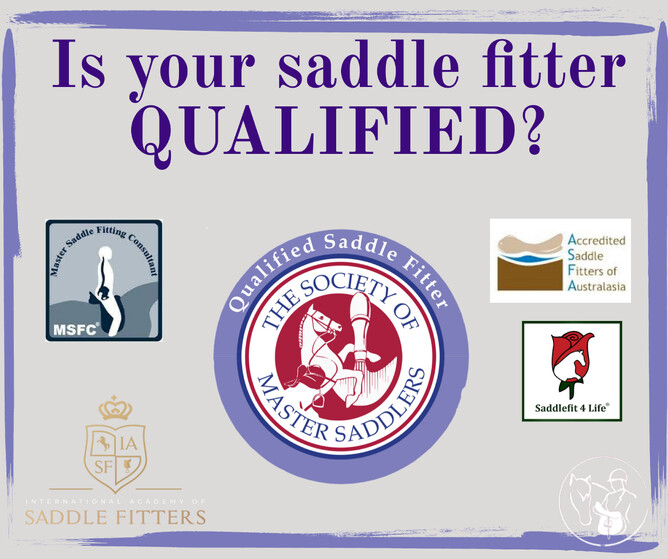I'm fortunate enough to work with a big team of fitters around the country, some are SMS qualified, some are training under SMS and some are qualified under different fitting training providers, but we all agree on choosing someone who has spent some time with a training establishment.
Some important questions to think about regarding your Saddle Fitter.
So how do you choose the best saddle fitter for you?
This is honestly a lot to do with personality, budget and what you want from a fitting. Do you just want a 30 min consultation or do you want adjustments to be able to be done on the day?
Aren't all saddle fitters qualified?
No. There are no regulations/ requirements for anyone in NZ working as a saddle fitter to have ANY training. Think about that for a minute...
How do I know if a fitter is qualified?
Ask or check out their professional pages. If you can't see a mention of them being qualified, or in training, ask the fitter about where & how they have gained their knowledge.
But I can't afford a qualified fitter.
Horses are expensive. Getting qualified is expensive. Running a business is expensive. And often using an unqualified fitter is more expensive in the long term if they cause issues that you need to pay for vets/ physio's/ another fitter to come and work through.
'I get so confused as I hear so many conflicting opinions on saddle fitters, how do I know who is best'?
There isn't a magic answer. But here are some things to consider;
Are they qualified or planning to be?
If they are qualified, do they keep up with CPD to stay up to date with all the research coming through?
Does your fitter ask questions before seeing you to get an idea of what you want? Does your fitter make it clear to you what will be expected at you appointment?
Does your fitter try to work within your budget, and if they can't discuss some second hand options to search for?
Do you know how to handle any issues that may arise post fitting? (Weird I know, but we do only see you ride for such a small amount of time, it's important if there are any concerns after the fitting you know how to reach out if you need to.)
Do you use their "support team" , recommendations by body workers/ vets/ coaches etc. who often work along people who can be approached with various ideas/ concerns.
Personality, talk to them, do they sound like 'your people' and someone you feel comfortable talking about your issues too (Cause sometimes we do have to talk about discomfort in our delicate regions!)
What is my background & qualifications?
I graduated Charles Sturt University with a BaApSc in Equine Studies in 2007, and then in 2017 I Qualified as a Society of Master Saddlers (SMS) saddle fitter.
Most people are familiar with a bachelors degree taking 3 years, but did you know that to become SMS qualified it's now a minimum of 3 years as well?
Over the period of training you are not only being trained under a mentor and learning the practical applications of the job in regards to saddle fitting, but you are required to have training in flocking and adjustments too. I was fortunate enough spend a few weeks over the years working in the UK saddleries alongside saddle makers, and getting to see saddle process from the wood the tree's are made from to the finished saddles being delivered to clients. You are encouraged to go out with other fitters to further your experience and start your continuing professional development to stay abreast of new knowledge in the saddle fitting industries.
In 2017 I went back to the UK to sit my saddle adjustment and flocking certification (required to pass your exam) and to sit my SMS qualified saddle fitter exam. There was a 5 day 'finishing' school to attend before you did your exams . This was broken down into 5 modules:
Principles of saddle fitting (theory)
Conformation and condition for saddle fitting
Taking a template
Practical saddle fitting
Saddle assessment and fault identification
And after all that, the more we know, the more we know we have to learn about the saddle/ rider/ horse dynamics.
So what is the take home message?
Being qualified or working towards being qualified is HARD, and really expensive and time consuming. BUT fitters who value their profession and offering you the best service they can, will have, or be working towards being qualified, and staying upskilled.





